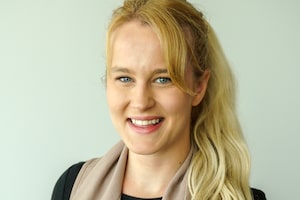American political writer Sam Tanenhaus is teaching a course on Donald Trump's presidency and media manipulation at the University of Toronto this semester, Sept. 25, 2018.Galit Rodan
There’s a malleable syllabus in Sam Tanenhaus’s new class at the University of Toronto, because its subject matter develops too rapidly for an unbreakable plan.
Nearly 200 students registered for the one-semester study of Donald Trump’s presidency and its intersection with the media taking place this fall. But they haven’t signed up for a typical course. Instead, what they’ll get is an experiment with "history in the present tense,” as new course material unfolds on the world stage between each two-hour lecture.
Take the period of time between registration and the first class, for example: Bob Woodward’s Fear was published, The New York Times ran its anonymous op-ed and, riding on a wave of backlash, former Trump strategist Steve Bannon was uninvited from this year’s New Yorker Festival by the magazine’s editor, David Remnick. “Amorphous and confused” is just one of the phrases Mr. Tanenhaus uses to describe his class, where he expects the syllabus and lectures will divert with the news cycle.
"[History] has never moved at warp speed like this,” said Mr. Tanenhaus, who is in Toronto for the next few months as a visiting professor and fellow of the Munk School. “I’m as bewildered as anyone else. And what we’re actually trying to figure out is the title of Hillary’s book. What happened?”
Standing at the front of Alumni Hall Room 404 an hour earlier, Mr. Tanenhaus was deep in the weeds of his own question. Shirtsleeves rolled up and rapt on a lively debate about Mr. Bannon’s politics, Mr. Tanenhaus shared personal anecdotes from his days as a New York Times editor and freelance magazine writer as part of the discussion. His timely tales are a reminder that the events being discussed in the class are occurring in real time.
At one point, he chats candidly about trying to reach Mr. Bannon for a recent piece he wrote for Vanity Fair on U.S. Education Secretary Betsy DeVos.
“He’ll say [by text] 'where R U @’. And I’d have been trying to reach him 12 hours ago, because I’m trying to interview him for a story. And I’ll say ‘I’ll try to call you, we’re in Toronto now setting stuff up, I’ll try to reach you tomorrow at 1,’ " he said. "I’ll get the letter, ‘K.’”
If history is written by the victor, Mr. Tanenhaus is diving in before the battle ends. His class has no clear parallels at Canadian universities, though some other professors have dabbled in contemporary history as part of larger courses or preplanned lectures.
One such professor is Veldon Coburn, an Indigenous Studies instructor at Carleton University who had planned two contract lectures this spring at McGill on violence against Indigenous people. By a stroke of chance, his lectures lined up with two acquittals in Canadian courts – one for Gerald Stanley, who shot and killed 22-year-old Colten Boushie, a Cree man, and one for Raymond Cormier, who’d been charged with murdering Tina Fontaine, a 15-year-old girl from Sagkeeng First Nation. His first lecture was open to the public in light of the Stanley trial news, and he said the emotion in the room was “palpable.”
Prof. Coburn, who is Algonquin from Pikwàkanagàn, sees value in Indigenous people telling their own histories as they happen, rather than becoming a passive part of someone else’s retelling. He doesn’t see Indigenous history as an objective phenomenon, any more than any history can be objective – everything comes from someone’s perspective.
Back in Mr. Tanenhaus’s class, when a conversation broke out about anti-Semitism, he paused the discussion to ask whether everyone felt comfortable with the arguments.
Given the non-traditional nature of the class, where perspectives on the material may be fresh and raw, he says he won’t “really challenge” forceful statements his students might make. The class isn’t intended as "strict academic media studies,” he said, but rather a mesh of history, current-event politics and a study of narrative. Certainly, he said, there are risks in teaching history as it happens.
“You don’t want to get stuff wrong,” Mr. Tanenhaus said. Every week, he’s grappling with course content that could change, update or pivot with what’s happening in the news. “You don’t want to be disproved or discredited later, so you try to be careful.”
Godefroy Desrosiers-Lauzon, an expert in historiography who lectures at several Canadian universities, said there’s no way to know which perspectives will stick in the long-term record of Mr. Trump’s presidency – a price of teaching history with such immediacy. But with fewer and fewer students enrolling in university history courses, he said, this kind of class offers more obvious relevance.
"We will, at the very least, be able to think critically about people’s historical perspective in the present,” Prof. Desrosiers-Lauzon said. "Trump has a perspective on history. His cabinet members and his supporters, all their various stripes, they have takes on human events, takes on history.”
Each offers a new historical gaze for Mr. Tanenhaus’s class to examine, using the techniques of traditional history studies, such as critical reasoning and analysis.
Prof. Desrosiers-Lauzon’s reaction to Mr. Tanenhaus’s classroom experiment? “I’m a bit jealous," he said.
 Victoria Gibson
Victoria Gibson